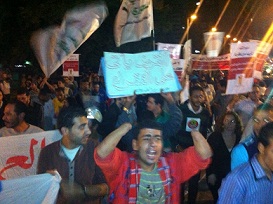
A number of civil society groups and political parties marched from the Egyptian stock exchange to the Cabinet building expressing their opposition to the possible loan that Egypt is looking to secure form the International Monetary Fund (IMF).
The groups published a statement online, which was addressed to Prime Minister Hesham Qandil and Christine Lagarde, managing director of the IMF. In the statement the groups expressed “concern about the proposed $4.8bn IMF loan to Egypt.” The groups provide a number of reasons for their concerns. They believe that to accept the loan would constitute an abuse of power by President Mohamed Morsy, since he currently wields full legislative powers only in the absence of parliament.
The statement also claims “the public consultation carried out by the government so far… has been exclusionary” and “the government do not explain how this loan will contribute to the national economic plan for inclusive growth and social justice.”
Ramy Sabry, a member of the Socialist People’s Party (SPP) said “we are marching against the loan because it will not be good for our country. The acceptance of the loan is a reflection of economic policies of the Hosni Mubarak regime which depended on international loans. If we accept the loan it means we will be follow the wishes of the United States and the IMF and become dependent on them again.”
Sabry offered a number of alternatives to the IMF loan, he said “the government can change the taxation system, for example they could tax businessmen. The government could save money by stopping unnecessary projects and unnecessary government jobs. The government employs many people who are well paid but do not do very much.”
Negotiations are ongoing between the IMF and the Egyptian government about the $4.8bn loan. It is hoped that the loan will help to solve the Egyptian economy’s problems, such as the budget deficit (which is at 11 per cent of gross domestic product), widespread youth unemployment and dwindling foreign reserves.
Sammy, one of the protesters unaffiliated with any political group, said he was marching because there is a lack of transparency in the negotiation process. “The loan,” he said, “would have a drastic and negative social and economic effect on the country.”
Mohamed Hatam, another unaffiliated protester, said he disagreed with the loan because it would only serve to increase Egypt’s debt. “And in repaying the debt,” he said, “it will be the poor who suffer.” He also said that so much money from the old regime was lost to corruption that the country must work to reclaim it in order to aid the economy.
An agreement with the IMF would also help to unlock $1bn in aid that has been offered by the US and Europe under the Deauville Partnership framework. The European Union and the G-8 group set up the framework to provide financial support to the Arab Spring countries.
Additional reporting by Luiz Sanchez

